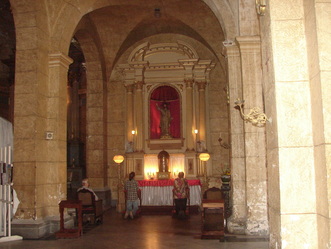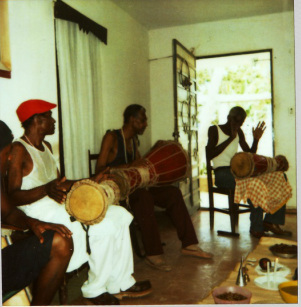
When we look at secondary definitions of the word cult, it becomes a little clearer why some people choose it when talking about Santería. Webster's Dictionary, for example, says the word cult is used for religions that are considered unorthodox and spurious (that is to say, phony). Another dictionary says it refers to a small group of people whose religious beliefs are considered strange or sinister by other people. Cult carries negative connotations, and is used to put down the beliefs of people who are perceived to be outside the mainstream. So, doesn't the choice of the word cult imply religious intolerance? To me, it does.
Religion has a more positive meaning for most people It refers to a belief system that puts human beings in communication with a higher power that's recognized as divine and sacred. Religion helps humans understand the universe, their purpose in life, and proper conduct in human affairs. Santería has all of these defining traits. For anyone who practices Santería, there's no doubt that it's a religion. Why are others reluctant to use that word to describe it? There are some complicated thought processes at work behind the choice of words, and it's worthwhile to look at some of them more closely.

Santería is practiced by an estimated million people in the USA today, and globally, we're talking about as many as 100 million practitioners. These aren't small numbers. But, Santería isn't as visible as some other religions. For example, there aren't Santería churches where people congregate on a specific day of the week to attend Mass or hear a sermon. There's no way to immediately identify a Santería practitioner, because they can be people of any race, ethnicity, age group or profession. Many are people of color, bringing up the whole issue of racism for us to consider - notice how often people call Santería a "primitive" religion? What makes it primitive? It's association with Africa? African had highly developed civilizations when people in Northern Europe still lived in caves. There's still a shadow over Santería, associating it with "those people" who are dark skinned and poor, due to the fact that for years in Cuba and elsewhere in the Caribbean, it was a religion embraced by slaves and the descendants of slaves rather than the wealthy white elite. Today, there are Santeros/as who are doctors, lawyers, engineers, professors, architects, writers, artists, businessmen and women, entrepreneurs; not everyone who practices the religion is poor and undereducated. The religion has been embraced by smart people who are leaders in their communities, but not everyone knows they practice Santería. Why? Because there's still some fear of rejection, loss of position and prestige, social marginalization by others who find Santería objectionable. How many people in mainstream society would feel comfortable going to a doctor who openly declares that he's also a practicing Santero?
The process of making Santería more acceptable in mainstream culture is a slow and painful one. It's something like the process of a gay person coming out of the closet. There's risk involved. Rejection. Loss. Punishment. Despite the fact that our constitution says we have religious freedom, there's still a lot of intolerance for religions that are too different from the mainstream ones. I don't know that there's any solution to the problem, but I do know that words matter. Choosing to use the word religion and correcting people who use the word cult to talk about Santería is a very tiny step, but at least it's a step in the right direction. First, admit that it IS a religion, and from there, we'll work on correcting other misconceptions.
 RSS Feed
RSS Feed
